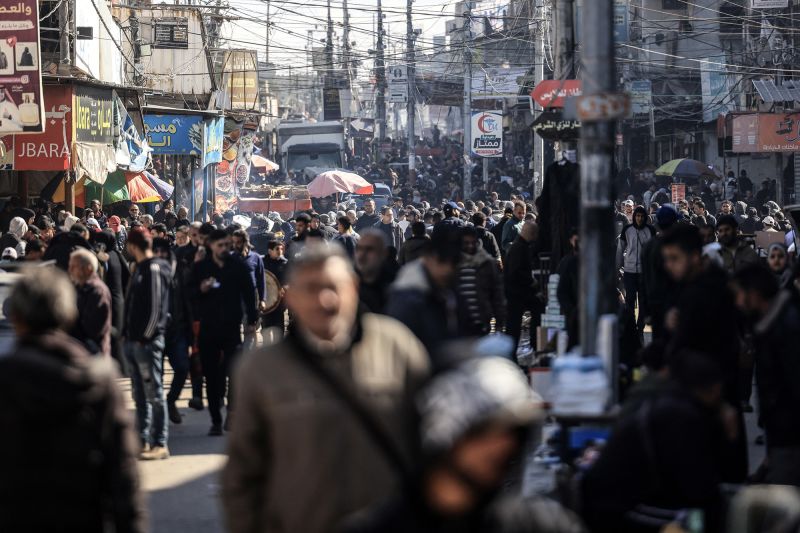
Netanyahu directs Israeli military to draw up plan to evacuate more than one million people from Rafah as offensive looms
Israeli Prime Minister Benjamin Netanyahu has directed the country’s military to plan for the “evacuation of the population” from Rafah, his office said in a statement on Friday, ahead of an anticipated ground assault on the southern Gaza city.
More than 1.3 million people are believed to be in Rafah, the majority displaced from other parts of Gaza, according to the United Nations.
Netanyahu on Thursday said that the Israel Defense Forces (IDF) would “soon go into Rafah, Hamas’s last bastion.”
Many Palestinians have trekked through the enclave and taken refuge in the city as the IDF’s campaign has moved south through Gaza.
But it is unclear where next they could go; the city borders Egypt to the south, but the border into the country has been closed for months.
In the statement, the Israeli Prime Minister’s Office said that it was not possible to both eliminate Hamas and leave “four Hamas battalions in Rafah.”
“On the other hand, it is clear that a massive operation in Rafah requires the evacuation of the civilian population from the combat zones.”
“That is why the Prime Minister directed the IDF and the defense establishment to bring to the Cabinet a dual plan for both the evacuation of the population and the disbanding of the battalions.”
Rafah is the last major population center in Gaza not occupied by the IDF.
It has rapidly become home to a huge population of displaced Palestinians. Satellite images showed this week how a tent city in Rafah has swelled in size in just a few weeks, as more Gazans descend on the area to escape the IDF’s campaign.
In a statement Friday, the office of Palestinian Authority President Mahmoud Abbas condemned the plan for military escalation and called a potential evacuation a “real threat” and “dangerous prelude” to the Israeli displacement of Palestinian people from their land.
“The time has come for everyone to bear their responsibility in the face of creating another catastrophe that will push the entire region into endless wars,” the statement said.
“We are praying to God that what happened in Gaza City does not happen in Rafah because if the same happens in Rafah we will have no place to go,” Mohammad Jamal Abu Tour said.
“If we go to Gaza City or Khan Younis or El Nuseirat we are not going to find the supplies that were provided for us here in Rafah,” he added. “We keep hearing that in Gaza City they can’t find clean water and that they are eating grass, they drink from the sea, God help them.”
Mahmoud Khalil Amer, who was displaced from the Al Shati refugee camp in northern Gaza, said he stayed in a tent near a cemetery in Rafah. “We are not living, the dead are better than us,” he said.
A spokesperson for the United States State Department said Thursday that the US would not support an Israeli military operation in Rafah “without serious planning.”
“To conduct such an operation right now with no planning and little thought in an area where there is sheltering of a million people would be a disaster,” Deputy State Department Spokesperson Vedant Patel said at a press briefing Thursday.
Later on Thursday, President Joe Biden offered one of his sharpest rebukes to date of Israel’s military conduct saying the operation to go after Hamas had been “over the top.”
“I’m of the view, as you know, that the conduct of the response in Gaza – in the Gaza Strip – has been over the top,” Biden told reporters at the White House, describing his own efforts to open up Gaza so more humanitarian aid could flow in.
“I’ve been pushing really hard – really hard – to get humanitarian assistance into Gaza. A lot of innocent people are starving. A lot innocent people in trouble and dying. And it’s got to stop,” Biden said.
The Norwegian Refugee Council (NRC) meanwhile said in a press release Thursday that Rafah could soon turn “into a zone of bloodshed and destruction that people won’t be able to escape.”
